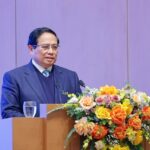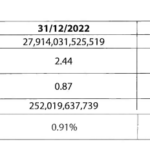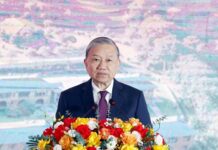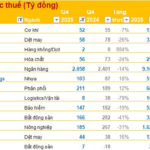On the afternoon of the 20th of December, the President’s Office held a press conference to announce the President’s Decree on the promulgation of laws and ordinances passed by the 15th National Assembly and its Standing Committee.
Developing Renewable Energy in a New Era
Deputy Minister of Industry and Trade, Truong Thanh Hoai, asserted that the amended Law on Electricity would address the current challenges faced by the electricity sector, ensuring energy security and contributing to the net-zero goal while fostering sustainable and efficient development.
A novel aspect of the amended Law on Electricity is the focus on developing renewable and new energy sources. It comprehensively regulates offshore wind power development, from project surveys to investment approval procedures and investor selection.
Mr. Hoai clarified that, according to the current law of the sea and islands, the management of constructions beyond six nautical miles differs, while offshore wind power technology is employed within the six-nautical-mile range. However, the construction process considers the unity of the legal system.
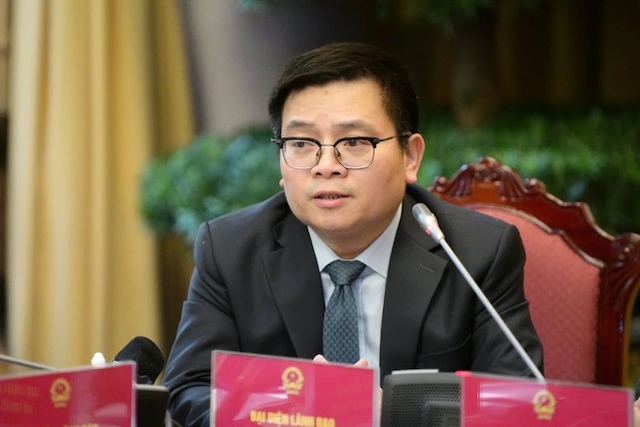 Deputy Minister of Industry and Trade, Truong Thanh Hoai, stated that competitive market regulations had been supplemented. Source: HTQ
|
Regarding rooftop solar power, Mr. Hoai mentioned that the law provides relatively clear regulations, but some technical issues ensure the stability of the power system, such as the ratio of renewable energy, which will be determined for each period, depending on Vietnam’s power grid infrastructure.
“If the base power sources develop well, we will have room to promote renewable energy. Otherwise, solutions like storage batteries will be implemented to balance the power system,” said the Deputy Minister of Industry and Trade.
On the topic of the competitive electricity market and power purchase and sales, the Deputy Minister shared that the law has supplemented provisions on temporarily suspending and restoring the immediate electricity market within the competitive electricity market at various levels.
Additionally, it has incorporated methods for guiding and formulating prices for transmission grids constructed by non-state economic components and introduced a two-part tariff structure, including capacity and electricity prices.
According to Mr. Hoai, the Law on Electricity also incorporates specific content on dispatching and operating the national power system, protecting power engineering works, and ensuring safety in the electricity sector, along with provisions for implementation.
“To ensure the effective implementation of the Law on Electricity, which will officially take effect from February 1, 2025, the Ministry of Industry and Trade is expediting the formulation of decrees and circulars to guide its enforcement,” Mr. Hoai emphasized.
Shifting from Pre-inspection to Post-inspection
Meanwhile, Deputy Minister of Planning and Investment, Nguyen Duc Tam, provided information about the “1 law amending 4 laws,” including the Law on Investment. The amendments empower provincial People’s Committees to approve investment proposals for projects involving the construction and business of industrial park, export processing zone, and economic zone infrastructure.
This also applies to projects for the construction of special seaports with a scale of less than VND 2,300 billion and projects located in the protection zones of national and special national relics.
The Law on Investment introduces a special investment procedure for projects in the fields of semiconductor and high technology in industrial parks, export processing zones, high-tech zones, and free trade zones, shifting from “pre-inspection” to “post-inspection.”
Notably, when investors submit dossiers in these sectors, the issuance of investment registration certificates will be completed within 15 days.
“Compared to the current process, the special investment procedure will shorten the project implementation time by about 260 days. This breakthrough measure demonstrates a new approach to institution building, ensuring both state management requirements and business facilitation,” said Mr. Tam.
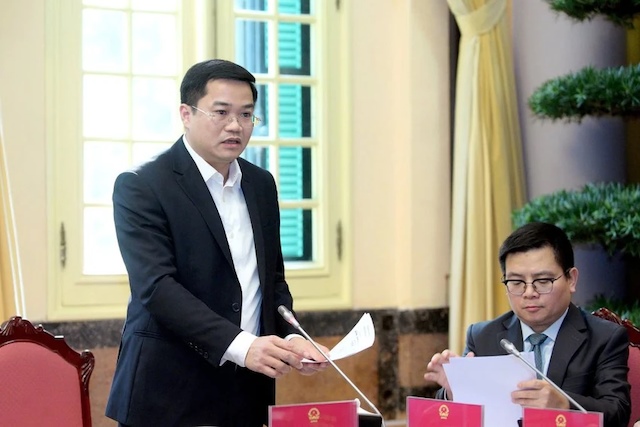
Deputy Minister of Planning and Investment, Nguyen Duc Tam, explained that the special investment procedure reduces project implementation time by 260 days. Source: HTQ
|
The spirit of enhancing decentralization and empowerment is also evident in the amendments to the Law on Public Investment. The law has been revised based on the principle of changing the mindset and management methods from “pre-inspection” to “post-inspection,” from “management” to “management for creative development,” and embracing the philosophy of “localities decide, localities do, and localities take responsibility.” Red tape has been cut to prevent a “permit-granting” mechanism.
According to Mr. Tam, the amended policies in the Law are well-considered, clear, genuinely important, urgent, and practically tested, necessitating their institutionalization.
The new Law on Public Investment also promotes decentralization and empowerment, enhances the accountability of leaders, and increases the flexibility and proactiveness of various sectors in managing and implementing public investment plans. It further facilitates the implementation and disbursement of ODA capital and preferential loans from foreign donors.
|
The nine laws and one ordinance promulgated on December 20 include: Law amending and supplementing a number of articles of the Law on Pharmacy; Law on Juvenile Justice; Law on Geology and Minerals; Law on Air Defense and Air Force; Law amending and supplementing a number of articles of the Law on Officers of the People’s Army of Vietnam; Law on Public Investment; Law on Electricity; Law amending and supplementing a number of articles of the Law on Health Insurance; Law amending and supplementing a number of articles of the Law on Planning, Law on Investment, Law on Investment in the form of Public-Private Partnership, and Law on Bidding (1 law amending 4 laws); and Ordinance on Litigation Costs. |
CHAN LUAN
Proposed Foreign Capital Limit of Up to 65% in the Offshore Wind Power Project Consortium
The Ministry of Industry and Trade has proposed an offshore wind power project with an attractive incentive package. During the construction phase, the project will be exempt from sea area usage fees, and for the first 12 years of operation, these fees will be reduced by 50%. Notably, the proposal includes a requirement for foreign investors to partner with Vietnamese enterprises, with foreign ownership not exceeding 65%.
The Power of Persuasion: Unlocking the Potential of the Central Energy Center with a “Huge” Investment Proposal from Quang Tri
The People’s Committee of Quang Tri Province has petitioned the Prime Minister to consider adding an additional 1,500-2,000 MW of onshore wind power and an impressive 2,600-4,000 MW of offshore wind power to the region’s energy mix.
Unlocking Vietnam’s Renewable Energy Potential: Overcoming Hurdles for a Brighter Future by February 2025
Prime Minister Pham Minh Chinh has instructed relevant authorities to address all obstacles and challenges faced by renewable energy projects by January 31, 2025. This proactive measure aims to prevent wastefulness of already invested capital and ensure a supplementary energy source to meet the economic development goals for 2025.
“The Troubling Financial Woes of Trung Nam Group: A Daunting Reality”
As of the end of 2023, Trung Nam Construction Investment Joint Stock Company (Trung Nam Group) had accumulated a debt of over VND 65,000 billion, 2.68 times their equity.



